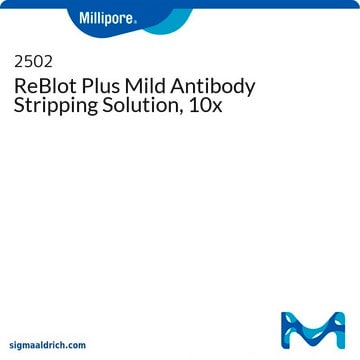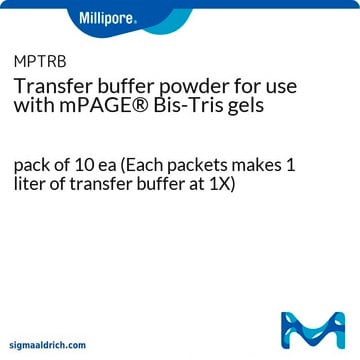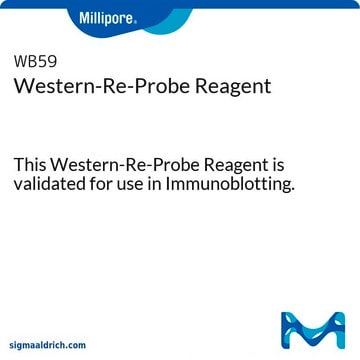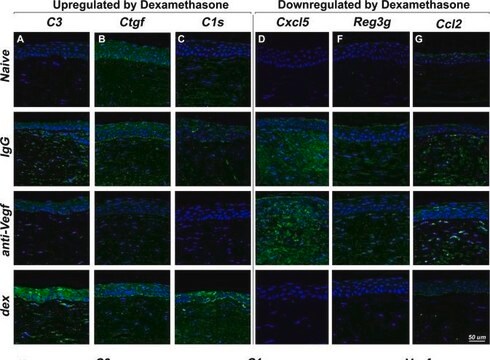2504
ReBlot Plus Strong Antibody Stripping Solution, 10x
Sinónimos:
Western blot stripping solution, blot stripping solution
About This Item
Productos recomendados
form
liquid
packaging
pkg of 50 mL
manufacturer/tradename
Chemicon®
Re-Blot™
technique(s)
western blot: suitable
detection method
chemiluminescent
shipped in
wet ice
General description
Stripping and re-probing of Western blots offers several advantages:
1) Conservation of samples that are expensive or available only in limited quantities,
2) Analysis of a given blot using several different antibodies, e.g. subtype- or isoform-specific antibodies,
3) Re-analysis of anomalous results and confirmation with the same or a different antibody,
4) Correcting errors in incubation with the wrong antibody,
5) Cost savings in reagents and time by reusing the same blot.
While antigen and antibody-based immunoaffinity matrices, such as Sepharose™ conjugates, have been reused many times without compromising antigen-antibody reactivity, the need for pH extremes and chaotropic agents has precluded the application of these methods to Western blotting.
The MILLIPORE Re-Blot Plus Western Blot Strong Antibody Stripping Solution contains specially formulated solutions that quickly and effectively remove antibodies from Western blots without significantly affecting the immobilized proteins.
Advantages of the Re-Blot Plus Western Blot Strong Antibody Stripping Solution include:
· No pungent-smelling b-mercaptoethanol is contained in the Antibody Stripping Solution.
· Antibody stripping is done at room temperature. No heating of blots is required.
· Blots can be stripped of antibodies in approximately 15 minutes at room temperature.
· Blots may be reused in 25 minutes.
Application
The Re-Blot Plus Western Blot Strong Antibody Stripping Solution should be used only for qualitative purposes until it has been established by comparative blot analysis that stripping does not quantitatively affect a given antigen.
This product is for research use only; not for diagnostic or in vivo use.
Components
Storage and Stability
Note: To prevent reagent degradation secure the cap tightly upon storage. Avoid extended exposure to air.
Legal Information
Disclaimer
signalword
Danger
Hazard Classifications
Acute Tox. 3 Dermal - Acute Tox. 3 Inhalation - Acute Tox. 4 Oral - Aquatic Chronic 2 - Eye Dam. 1 - Met. Corr. 1 - Skin Corr. 1A
Storage Class
6.1B - Non-combustible acute toxic Cat. 1 and 2 / very toxic hazardous materials
wgk_germany
WGK 2
flash_point_f
Not applicable
flash_point_c
Not applicable
Certificados de análisis (COA)
Busque Certificados de análisis (COA) introduciendo el número de lote del producto. Los números de lote se encuentran en la etiqueta del producto después de las palabras «Lot» o «Batch»
¿Ya tiene este producto?
Encuentre la documentación para los productos que ha comprado recientemente en la Biblioteca de documentos.
Los clientes también vieron
Protocolos
Protocol for sample preparation for cell lysis and efficient protein extraction from cultured tissues and cells for subsequent Western blotting.
Protocol for sample preparation for cell lysis and efficient protein extraction from cultured tissues and cells for subsequent Western blotting.
Protocol for sample preparation for cell lysis and efficient protein extraction from cultured tissues and cells for subsequent Western blotting.
Protocol for sample preparation for cell lysis and efficient protein extraction from cultured tissues and cells for subsequent Western blotting.
Nuestro equipo de científicos tiene experiencia en todas las áreas de investigación: Ciencias de la vida, Ciencia de los materiales, Síntesis química, Cromatografía, Analítica y muchas otras.
Póngase en contacto con el Servicio técnico



















